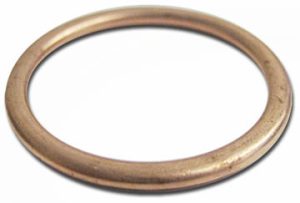
Not all gaskets are made of a synthetic polymer like silicone or rubber. You can find them in a variety of materials, such as copper. Copper gaskets are used in many of the same sealing applications as their all-synthetic counterparts, but they feature a copper case.
What Are Copper Gaskets?
Copper gaskets are mechanical seals that feature a copper case. Also known as copper-enclosed gaskets, they aren’t made entirely of copper. Rather, copper gaskets feature a copper case and an elastic inner perimeter.
How Copper Gaskets Work
To seal the mating surface between two or more parts, you may want to use a copper gasket. Like all gaskets, copper gaskets are designed to prevent fluids or gases from leaking. Certain parts can carry pressurized gases or fluids. Coolant hoses, for instance, may carry pressurized coolant, whereas oil lines may carry pressurized oil.
Pressurized fluids and gases can leak out of unsealed mating surfaces. Gaskets, however, offer a simple and effective solution. You can install them around gas- or fluid-carrying parts to seal the mating surfaces of those parts. All-synthetic and copper gaskets are both mechanical seals, and they are used for the same purpose of sealing mating surfaces.
The Benefits of Copper Gaskets
Copper gaskets offer several benefits. When compared to all-synthetic gaskets, they are stronger. Many automakers use copper head gaskets for their respective engines. Head gaskets are placed between engine blocks and cylinder heads. Rather than using an all-synthetic gasket, automakers often use copper gaskets. Copper is a stronger, more durable material, so copper head gaskets typically last longer than their all-synthetic counterparts.
How much pressure can copper gaskets withstand exactly? You can refer to their pressure rating for this information. Some copper gaskets have a pressure rating of 200 pounds per square inch (PSI). Others have an even higher pressure rating.
Copper gaskets offer better thermal conductivity than all-synthetic gaskets. Copper is an excellent conductor of thermal energy. This is why it’s used to make heat exchangers and heat sinks. Copper gaskets exhibit similar characteristics. They are able to conduct heat better than gaskets made entirely of a synthetic material.
Even with their copper case, copper gaskets still feature an elastic inner perimeter. The inner perimeter is typically made of a traditional elastic material like rubber butadiene-acrylonitrile. When exposed to hot and pressurized gas or fluid, the inner perimeter will expand. This expansion will result in a stronger seal that prevents the parts with which it’s used from leaking.



